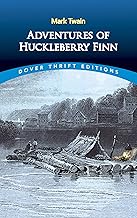Adventures of Huckleberry Finn follows a young boy, Huck Finn, as he escapes his abusive father and sets off on a journey down the Mississippi River with Jim, a runaway enslaved man. Along the way, Huck grapples with the values he has been taught versus what he learns from his experiences with Jim.
The novel explores deep themes such as freedom, friendship, moral growth, and the injustice of slavery, all through the eyes of a boy learning to see the world differently. Huck’s internal struggle about helping Jim gain his freedom becomes a powerful statement about personal conscience and human dignity.
Despite the controversy it continues to spark, Adventures of Huckleberry Finn remains a groundbreaking and essential novel that challenges readers to confront the complexities of America’s racial past and the meaning of true morality.
About the Author
Mark Twain, whose real name was Samuel Langhorne Clemens, was born in 1835 in Missouri. He is considered one of the greatest American writers and humorists.
Twain grew up along the Mississippi River, which later became the rich backdrop for many of his stories, including Adventures of Tom Sawyer and Adventures of Huckleberry Finn.
Twain was deeply critical of the moral failings he saw in American society particularly racism, class inequality, and blind conformity and he used his writing to challenge these issues. Known for his wit and sharp social commentary, Twain’s works remain vital parts of American literature.





